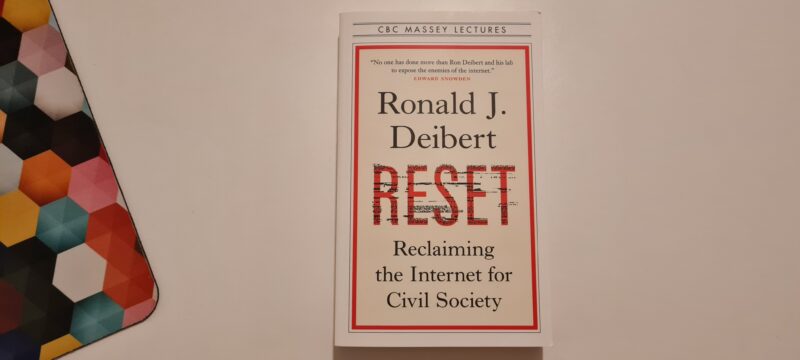“We can reclaim the internet for civil society. The principle of restraint should be our guide.”
The end.
Basically, I could stop here and write no more. These are the last two sentences of the book Reset: Reclaiming the Internet for Civil Society of Ronald J. Deibert and the profound solution to problems with internet, social media, tech companies, surveillance, espionage, cyberwars, is about.
Deibert founded The Citizen Lab in 2001 as a research group with a mission he had came up with: the dirty backside of the Internet. For once I read a boo by an author who doesn’t need to restort to the creepiest descriptions and depictions on what could happen – he controls this subject totally. You can read it between the lines, see it in the examples given, often from the research of the Citizen Lab and from various other sources, not the usual ones, he doesn’t inundate you with details and a massive amount of examples about everything that is inherently wrong with internet (for that, listen to Grumpy old geeks), and because of the chapters he’s chosen to focus on. He knows this stuff without the restless need to show how well he has (begun) to master this subject after a couple of years. The combination of chapters are his strength.
Causes
Surveillance capitalism as a concept is the first subject Deibert touches, writing about the omnipresent tech in our lives, the gadgets we surround ourselves with day and night, for most reasons. This has been covered by Carissa Veliz, Adam Alter (review coming) and (obviously) Shushana Zuboff (review coming), to name a few. Deibert writes about different absurd apps, ideas to capture more personal data and dangerous paths taken by companies, paths that can easily lead to authoritarian perspectives on society and societal change.
How our addictive machines are used to spread propaganda, disinformation, misinformation, to destabilize societies, divide and rule among foreign adversaries is another bleak chapter. Companies, state actors, organisations are playing a very perilous game with democratic states and risking all progress on human rights. Insititutions are seemlingly falling apart, or at least being unable to thwart a slide towards more fragile societies.
Thirdly, intrusive powers is about how technology is used to circumvent human rights and deliberation by (nation) states. Abuses of power become harder to track, inhibit and hold accountable. Technology is more often used to suppress minorities and people rather than elevate them.
Aspects of climate and environment are usually completely excluded from books written by tech-related authors. The link to the natural world is many times exempt from being questioned. Two of the few eexceptions are Kate Crawford and Tung-Hui Hu, both of whom I’ll cover in time.
I worked in politics for almost seven years and I concur with Deibert that “material factors play a major role in shaping political outcomes”, must be taken into account and politics should, at times, adapt to societal changes rather than neglecting them. Sometimes you simply follow, not lead. And tech is very much physical, material.
No other expert, that I have encountered, has been able to combine all these issues and subjects into one coherent text about the state of the internet and democracy. A fellow Canadian and political scientist at that, Taylor Owen (yes, listen to his podcast), is the closest one we’ve got.
Solutions
Deibert’s a political scientist at heart, although you might think (or decieve yourself) he’s a computer scientist, and it shows when he delves into solutions. He presents the ideas and theory of republicanism, the theory “to tie down and restrain the exercise of power not only domestically, but also across borders.” Politics usually move rather slowly in democratic states and rightfully so, argues Deibert and the republicans, because decisions should take time and deliberation is necessary so as not to react emotionally or irrationally due to some fancy. Deliberation has become a word with negative connotations. Things should be decided quickly, without thoughtful processes, almost impulsively. Deibert argues that deliberation offers restraint, inhibits decisions to be simple (and often stupid) reactions to very contemporary issues. As such, restraint should be exhibited much more, in social media, in politics, on technologically related decisions. Deliberation should be a guideline, not an insult.
At first my thoughts were similar to my reading of Beijmo’s De kan inte stoppa oss – basically, we’re f*cked. After a while I actually feel hope. For once, here’s a person with vast experience and knowledge of how bad things have turned for more than two decades, who can show us real adequate and suitable actions on a systemic level. Here are no individual recommendations on “block cookies”, “encrypt all your communications” or “refuse to use social media”. Deibert has spent more time than most humans on these issues, so what he writes is very much what we should do. We should move slower, more deliberately, in order to reclaim internet for civil society, not for states or companies.
Conclusion
If there’s one book to rule them all, this is the one.
